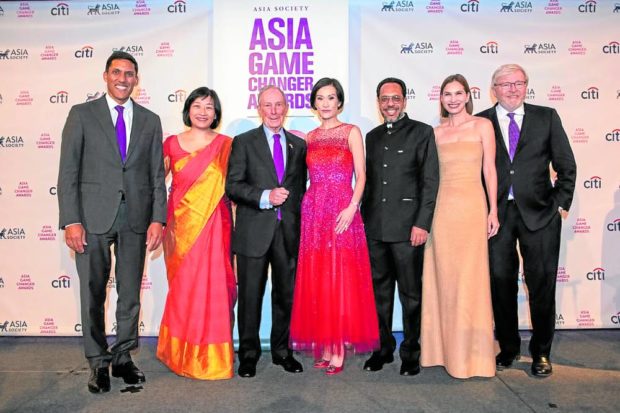
The 2022 Asia Game Changers onstage (from left) Rajiv Shah, Kristin Kagetsu, Michael Bloomberg, Ida Liu (emcee), Arunabha Ghosh, Nanette Medved-Po and Asia Society president and CEO Kevin Rudd —CONTRIBUTED PHOTOS
It is estimated that 46,000 pieces of plastic occupy each square mile of ocean.
Not surprisingly, it is also believed that two-thirds of the world’s fish stocks are suffering from plastic ingestion and about 100,000 marine creatures die from plastic entanglement each year.
Nanette Medved-Po started her community engagement by selling bottled water to raise money for the education programs of Hope (Generation Hope Inc. and Friends of Hope Inc.). With the money raised from the bottled water, the organizations built school buildings and helped students.
They have built 126 school buildings so far and have made a positive impact on the lives of more than 33,000 children.
But, as the devastating effects of plastic on the environment became more evident, Medved-Po decided they also had to do something about how to handle not only the plastic used in their bottles but other plastic waste, too. The urgency of finding a way to better manage plastic waste led to PCX (Plastic Credit Exchange LLC and PCX Solutions, Inc.).
PCX developed the world’s first standards for plastics, which Medved-Po said they had shared with other groups for reactions, comments, suggestions and critiquing.
Medved-Po’s initiatives made her this year one of the Asia Game Changer Awards recipients, given annually by Asia Society to recognize individuals and groups from every walk of life whose actions have profoundly strengthened the bonds between Asia and the rest of the world.
This year, the Game Changer Awards were presented to heroes who are addressing one of the world’s most urgent problems: the disruptive effects around the globe of climate change.
Medved-Po is the first Filipino woman to receive the distinction.
In an event organized by Asia Society Philippines, in partnership with Manila House, to celebrate Medved-Po’s award, the social entrepreneur discussed “What Is a Business for Good,” the evolution of her initiatives and how they were now addressing the plastic crisis, specifically.
The bottled water enterprise aimed to demonstrate to businesses that if a product was designed for the good of the community, its market would grow.
Along the way, she said, “we discovered other opportunities” and had gone into livelihood training and helping certain sectors like coconut farmers to increase their incomes by eliminating middlemen and bringing their products directly to the market.
As she learned more about the critical plastic problem, PCX was launched to help find solutions. One of its innovative responses is the “Aling Tindera” program that makes participating sari-sari stores into collection points where people can bring their plastic and other packaging waste and get paid for them.
Reacting to Medved-Po’s presentation, Love Gregorie Perez, director at xchange, an impact-first investor and incubator for early stage social enterprises in the Philippines, said marketing could be a powerful driver for success.
There are new models and new ways of thinking so people did not have to settle for the usual answers, she said. Perez added that change could be made gradually to allow people to get used to a new idea or an innovation.
The discussions were moderated by Bambina Olivares, Manila House’s director of public relations and arts, culture and education programming. —contributed INQ